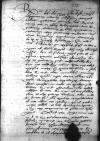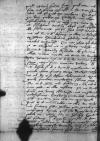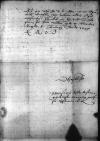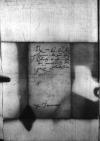Optaverat prioribus litteris Reverendissima Vestra Dominatio animi mei in ipsam declarationem, tum trigintarum marcarum, per dominos exactores retentarum, meam sententiam enodarem. Unum nempe scrupulum trigintarum marcarum ea ex re hucusque distulerim, cum notarius Ludwig Wersfelt ⌊LudovicusLudwig Wersfelt ⌋, qui regestis praeest, eo tempore ad Sigismund I Jagiellon (Zygmunt I) (*1467 – †1548), King of Poland and Grand Duke of Lithuania (1506-1548); Duke of Głogów (Glogau) (1499-1506), Duke of Opava (1501-1506), Governor of Silesia (1504-1506); son of King Kazimierz IV Jagiellon and Elisabeth of Austria⌊maiestatem regiamSigismund I Jagiellon (Zygmunt I) (*1467 – †1548), King of Poland and Grand Duke of Lithuania (1506-1548); Duke of Głogów (Glogau) (1499-1506), Duke of Opava (1501-1506), Governor of Silesia (1504-1506); son of King Kazimierz IV Jagiellon and Elisabeth of Austria⌋, dominum meum clementissimum, missus, domi non fuerat, apud quem et regestum exactionum occlusum, ad amussim doceri non potuerim, quid mihi ab illis datum aut reddendum.
Nunc vero, cum rediit, regestis inveni omnium exactionum summam a subditis Reverendissimae Vestrae Dominationis, clero, monialibus earumque subditis exactam iuxta eorum oblata regesta, quingentas triginta sex marcas, decem grossos cum medio non excedere. Quam summam, Reverendissimae Vestrae Dominationi offerendam, illis reddidi integre. Si vero Reverendissima Vestra Dominatio ab eius subditis, clero et aliis, quorum contributio eidem a Sigismund I Jagiellon (Zygmunt I) (*1467 – †1548), King of Poland and Grand Duke of Lithuania (1506-1548); Duke of Głogów (Glogau) (1499-1506), Duke of Opava (1501-1506), Governor of Silesia (1504-1506); son of King Kazimierz IV Jagiellon and Elisabeth of Austria⌊maiestate
s(ua) or s(acra)⌈s(ua)s(ua) or s(acra)⌉
Sigismund I Jagiellon (Zygmunt I) (*1467 – †1548), King of Poland and Grand Duke of Lithuania (1506-1548); Duke of Głogów (Glogau) (1499-1506), Duke of Opava (1501-1506), Governor of Silesia (1504-1506); son of King Kazimierz IV Jagiellon and Elisabeth of Austria⌋ donata est, plus exactum computaverit, id meo iudicio non vendico, qui id, quod accepi, reddidi, ut litteris dominorum exactorum reg recognitionis et quitantiae mihi precavi. Aliud vero, nempe animi mei in Dominationem Vestram Reverendissimam enucleationem, propterea distuli, ne variis uno tempore optatis diversis litteris responderem, quod nunc facio.
Animus meus semper in stain⌈[in]in stain⌉ Reverendissimam Vestram Dominationem candidus et ad obsequendum pro stain⌈[um pro]um pro stain⌉pensus,  1079 AAWO, AB, D. 67, f. 250v quod ingenue fateri licet. Quod vero aut fato, aut osorum persuasu a Reverendissima Vestra Dominatione spernitur, nihil est, quod ego inculpar, cum et quiqui boni, quibus ego conversor, non aliter testabuntur, quam me resque meas votis Reverendissimae Vestrae Dominationi subiectas, tantum abest, quod insignes illi susurrones, quiqui sint, non verentur me ad Reverendissimam Vestram Dominationem deferre in illam in descensu ex praetorio Graudenz (Grudziądz, Graudentium), city in Poland, Voivodeship of Pomerania, on the upper east bank of the Vistula, Graudenz (taking turns with Marienburg (Malbork)) was the venue for the Provincial Diet of Royal Prussia, which were chaired by the bishop of Ermland (Warmia)⌊GraudentinoGraudenz (Grudziądz, Graudentium), city in Poland, Voivodeship of Pomerania, on the upper east bank of the Vistula, Graudenz (taking turns with Marienburg (Malbork)) was the venue for the Provincial Diet of Royal Prussia, which were chaired by the bishop of Ermland (Warmia)⌋ gladium vibrasse aut hidden by binding⌈[ut]ut hidden by binding⌉ manibus arripuisse, cum nec fas est dicere hidden by binding⌈[e]e hidden by binding⌉ se eo tempore me in plateis vidisse, cum Reverendissima Vestra Dominatio praetorium descendit et quamvis illata iniuria mordet nec tamen ita torquet, quin honoris mei et Dominationis Vestrae Reverendissimae amicitiae, quam semper magni facio, rationem habeam.
1079 AAWO, AB, D. 67, f. 250v quod ingenue fateri licet. Quod vero aut fato, aut osorum persuasu a Reverendissima Vestra Dominatione spernitur, nihil est, quod ego inculpar, cum et quiqui boni, quibus ego conversor, non aliter testabuntur, quam me resque meas votis Reverendissimae Vestrae Dominationi subiectas, tantum abest, quod insignes illi susurrones, quiqui sint, non verentur me ad Reverendissimam Vestram Dominationem deferre in illam in descensu ex praetorio Graudenz (Grudziądz, Graudentium), city in Poland, Voivodeship of Pomerania, on the upper east bank of the Vistula, Graudenz (taking turns with Marienburg (Malbork)) was the venue for the Provincial Diet of Royal Prussia, which were chaired by the bishop of Ermland (Warmia)⌊GraudentinoGraudenz (Grudziądz, Graudentium), city in Poland, Voivodeship of Pomerania, on the upper east bank of the Vistula, Graudenz (taking turns with Marienburg (Malbork)) was the venue for the Provincial Diet of Royal Prussia, which were chaired by the bishop of Ermland (Warmia)⌋ gladium vibrasse aut hidden by binding⌈[ut]ut hidden by binding⌉ manibus arripuisse, cum nec fas est dicere hidden by binding⌈[e]e hidden by binding⌉ se eo tempore me in plateis vidisse, cum Reverendissima Vestra Dominatio praetorium descendit et quamvis illata iniuria mordet nec tamen ita torquet, quin honoris mei et Dominationis Vestrae Reverendissimae amicitiae, quam semper magni facio, rationem habeam.
Et nec diffido, si id a Reverendissima Vestra Dominatione impetravero, ut si hidden by binding⌈[i]i hidden by binding⌉ quando osores fucatis eorum stratagematibus me ad Reverendissimam Vestram Dominationem deferre laboraverint, expurgandi facultas concederetur, salvam semper Reverendissimae Vestrae Dominationis gratiam mihi futuram. Quod et nunc peto, ut illos resciam, qui me Reverendissimae Vestrae Dominationi famae aut honori oblatrasse aut iurisdictionem ecclesiasticam episcopique auctoritatem vendicasse hidden by binding⌈[e]e hidden by binding⌉ aiunt, quantum par erit, me expurgabo.
Quamvis et id animum addit, ut illis Reverendissima Vestra Dominatio nec sinceram fidem praebere, quin prius a me investigari written over e⌈eii written over e⌉ dignata, quod ut in posterum fiat hidden by binding⌈[t]t hidden by binding⌉, sedulo oro. Nuper cum in Golubensi capitaneatu fueram, a burgrabio inquisivi de decem marcis a plebano in Kurkocin, village in Poland, Pomeranian Voivodeship, in the historic Kulm Land, ca. 15 km N of Golub⌊KurkoczinKurkocin, village in Poland, Pomeranian Voivodeship, in the historic Kulm Land, ca. 15 km N of Golub⌋ acceptis. Negat hidden by binding⌈[t]t hidden by binding⌉ se stain⌈[se]se stain⌉ ullum accepisse denarium sicque si plebanu stain⌈[nu]nu stain⌉s institerit, faciam quid iuris, tum omnibus  1079 AAWO, AB, D. 67, f. 251r rebus pro votis Reverendissimae Vestrae Dominationis adero, ut nec conquerendi adversum ipsum habeat ullus aliquam occasionem.
1079 AAWO, AB, D. 67, f. 251r rebus pro votis Reverendissimae Vestrae Dominationis adero, ut nec conquerendi adversum ipsum habeat ullus aliquam occasionem.
Quibus me Reverendissimae Vestrae Dominationi commendo. Quam diu bene valere opto.
 1079 AAWO, AB, D. 67, f. 250r
1079 AAWO, AB, D. 67, f. 250r
 1079 AAWO, AB, D. 67, f. 250v quod ingenue fateri licet. Quod vero aut fato, aut osorum persuasu a Reverendissima Vestra Dominatione spernitur, nihil est, quod ego inculpar, cum et quiqui boni, quibus ego conversor, non aliter testabuntur, quam me resque meas votis Reverendissimae Vestrae Dominationi subiectas, tantum abest, quod insignes illi susurrones, quiqui sint, non verentur me ad Reverendissimam Vestram Dominationem deferre in illam in descensu ex praetorio
1079 AAWO, AB, D. 67, f. 250v quod ingenue fateri licet. Quod vero aut fato, aut osorum persuasu a Reverendissima Vestra Dominatione spernitur, nihil est, quod ego inculpar, cum et quiqui boni, quibus ego conversor, non aliter testabuntur, quam me resque meas votis Reverendissimae Vestrae Dominationi subiectas, tantum abest, quod insignes illi susurrones, quiqui sint, non verentur me ad Reverendissimam Vestram Dominationem deferre in illam in descensu ex praetorio  1079 AAWO, AB, D. 67, f. 251r rebus pro votis Reverendissimae Vestrae Dominationis adero, ut nec conquerendi adversum ipsum habeat ullus aliquam occasionem.
1079 AAWO, AB, D. 67, f. 251r rebus pro votis Reverendissimae Vestrae Dominationis adero, ut nec conquerendi adversum ipsum habeat ullus aliquam occasionem.


